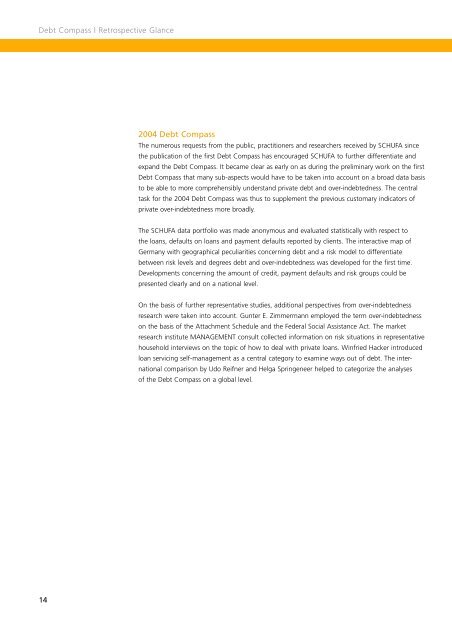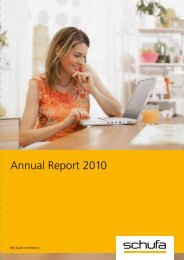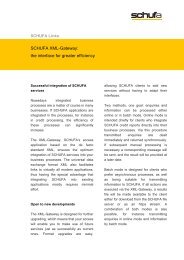Abridged English version of the SCHUFA Credit Compass 2008
Abridged English version of the SCHUFA Credit Compass 2008
Abridged English version of the SCHUFA Credit Compass 2008
You also want an ePaper? Increase the reach of your titles
YUMPU automatically turns print PDFs into web optimized ePapers that Google loves.
Debt <strong>Compass</strong> | Retrospective Glance<br />
14<br />
2004 Debt <strong>Compass</strong><br />
The numerous requests from <strong>the</strong> public, practitioners and researchers received by <strong>SCHUFA</strong> since<br />
<strong>the</strong> publication <strong>of</strong> <strong>the</strong> first Debt <strong>Compass</strong> has encouraged <strong>SCHUFA</strong> to fur<strong>the</strong>r differentiate and<br />
expand <strong>the</strong> Debt <strong>Compass</strong>. It became clear as early on as during <strong>the</strong> preliminary work on <strong>the</strong> first<br />
Debt <strong>Compass</strong> that many sub-aspects would have to be taken into account on a broad data basis<br />
to be able to more comprehensibly understand private debt and over-indebtedness. The central<br />
task for <strong>the</strong> 2004 Debt <strong>Compass</strong> was thus to supplement <strong>the</strong> previous customary indicators <strong>of</strong><br />
private over-indebtedness more broadly.<br />
The <strong>SCHUFA</strong> data portfolio was made anonymous and evaluated statistically with respect to<br />
<strong>the</strong> loans, defaults on loans and payment defaults reported by clients. The interactive map <strong>of</strong><br />
Germany with geographical peculiarities concerning debt and a risk model to differentiate<br />
between risk levels and degrees debt and over-indebtedness was developed for <strong>the</strong> first time.<br />
Developments concerning <strong>the</strong> amount <strong>of</strong> credit, payment defaults and risk groups could be<br />
presented clearly and on a national level.<br />
On <strong>the</strong> basis <strong>of</strong> fur<strong>the</strong>r representative studies, additional perspectives from over-indebtedness<br />
research were taken into account. Gunter E. Zimmermann employed <strong>the</strong> term over-indebtedness<br />
on <strong>the</strong> basis <strong>of</strong> <strong>the</strong> Attachment Schedule and <strong>the</strong> Federal Social Assistance Act. The market<br />
research institute MANAGEMENT consult collected information on risk situations in representative<br />
household interviews on <strong>the</strong> topic <strong>of</strong> how to deal with private loans. Winfried Hacker introduced<br />
loan servicing self-management as a central category to examine ways out <strong>of</strong> debt. The international<br />
comparison by Udo Reifner and Helga Springeneer helped to categorize <strong>the</strong> analyses<br />
<strong>of</strong> <strong>the</strong> Debt <strong>Compass</strong> on a global level.
















